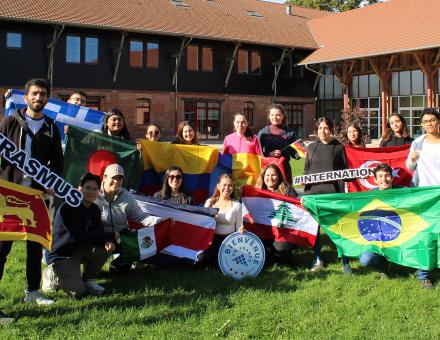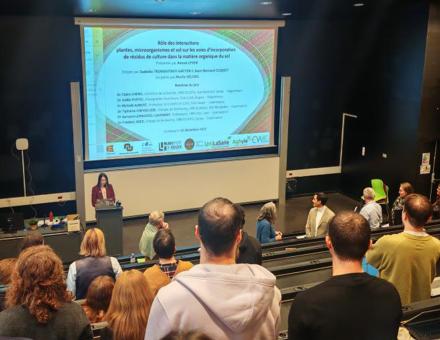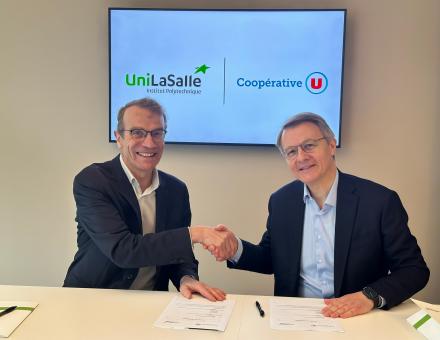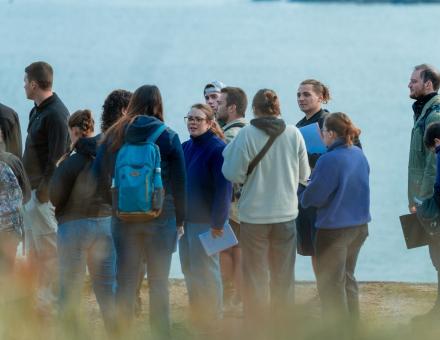Philippe Choquet, Director General of UniLaSalle, and Frédéric Martin, Vice Director General of GRDF, have signed the first Teaching and Research Chair in "Agricultural Methanization and Transitions" for a period of 4 years.
The signing took place in the presence of Philippe Lahet, Director of GRDF Nord-Ouest. The aim of this Chair is to train players in the sector (engineering students, farmers, local authorities) and to strengthen expertise in methanization at the service of agricultural systems and territories.
"We are delighted to strengthen our collaboration around common objectives: supporting the professionalization of the sector, improving knowledge and stimulating innovation through the establishment of this teaching and research Chair," emphasized Philippe Choquet, Director General of UniLaSalle.
"The development of green gases is essential to France's energy transition. Green Gases are an opportunity to decarbonize our emissions and relocate energy production to our territories in order to improve the country's energy sovereignty. Lastly, in addition to the significant job potential they generate, they are a relevant solution for recovering all our waste and promoting, for example in agriculture, the agro-ecological transition and the elimination of the use of chemical fertilizers. For all these reasons, I am pleased to sign this research and teaching partnership, which will help train the talent that the entire biomethane sector needs for the future. In the face of the climate and energy emergency, research in this field is more important than ever," said Frédéric Martin.
Specific training modules on methanization: contributing to the professionalization of the agricultural sector
By combining their expertise, UniLaSalle and GRDF intend to prepare future professionals for the challenges of the green gas sector by
- the creation of a specific training module on agricultural methanization as of the start of the 2023 academic year for students in the 4th year of their engineering training,
- the realization of projects of professional situation for the engineering students around the methanization,
- the implementation of a continuing education plan for professionals in the methanization sector. This teaching will allow students to acquire new knowledge in terms of support for the professionalization of the sector, and ultimately to meet the challenges of the energy and agro-ecological transition.
Research focused on the sustainability and resilience of agricultural production systems
Farmers are the main actors in the development of anaerobic digestion in a circular economy, while participating in the energy transition and the fight against climate change. The research will aim to consolidate the development of the methanization sector: optimizing the production of renewable gases, promoting the organization of the sector and the acceptability of projects within the territories. The agronomic approach will help to meet the challenges of the ecological transition of the territories and thus contribute to the achievement of carbon neutrality in 2050.
At the heart of this teaching chair is the sharing of knowledge that will bring together all stakeholders to prepare a new generation of green gas. The Chair's work will be widely disseminated through publications and public conferences bringing together scientists and public and private decision-makers.
Exchanges of skills between gas teams and UniLaSalle Beauvais researchers will also make it possible to think about tomorrow's gas network and prepare the energy mix of the territories. These research and training activities will be developed in the very heart of the Beauvais area, a territory that is "spearheading" methanization.
The Hauts-de-France region is pursuing the biomethane dynamic
In France, 477 methanization sites are already connected to gas networks. In the heart of the Hauts-de-France Region, 72 methanization units are injecting into the gas networks (with a production capacity of 1.5 TWh/year). The Region's ambition is to be the leading European region for injected biomethane. By 2030, 20% of the gas consumed will be renewable; by 2050, France has the potential to cover 100% of its gas demand with renewable gases. Methanization creates value and direct and indirect non-disposable jobs: with nearly 9,000 direct and indirect jobs generated in 2021 in France. The biogas sector is positioned as a lever for the creation of sustainable jobs in the regions.






